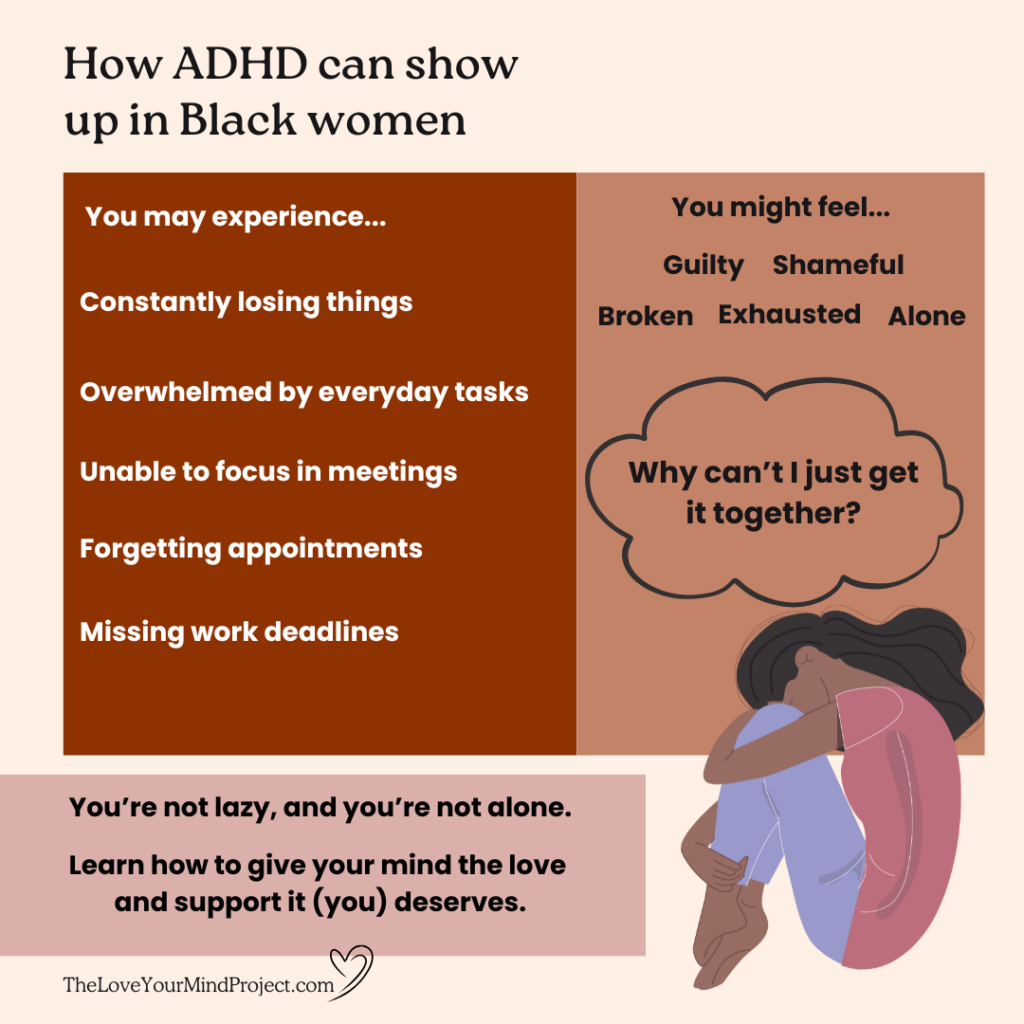- Feeling hopeless? Here’s how to find hope again (and reconnect with your strength) - November 6, 2025
- How to set boundaries with family (so you can enjoy the holidays) - October 30, 2025
- Journal prompts for anxiety: 16 ideas to calm racing thoughts - October 23, 2025
ADHD in Black women is often overlooked, but with the right treatment and support, you can manage your ADHD symptoms and live fully – without shame and without apology.

You’d lose your head if it weren’t attached to you.
You feel so forgetful. Absent-minded.
Why can’t you just focus more at work? Why don’t you pay attention when they’re talking to you?
Attention deficit/hyperactivity disorder (ADHD) can leave you feeling overwhelmed and out of sorts in everyday situations. And when you don’t know what you’re dealing with, it’s easy to blame yourself – thinking you’re just unorganized, forgetful, or somehow falling short.
But here’s the truth. ADHD is not a character flaw. It’s a mental health condition that’s often misunderstood, misdiagnosed, or overlooked – especially in Black women.
This article explains ADHD, how it can show up, and how to find the help and support you deserve.
What's in this article?
What is ADHD?
ADHD is a condition that affects how the brain develops and functions.
How we move through the world depends partly on the connections in our brains and the signals sent between them. If you have ADHD, some of those signals may not be as strong, primarily in the parts of the brain that help with executive functioning – reasoning, decision-making, and focusing your attention 1.
While “deficit” and “disorder” are part of the name, you are not defective or broken. ADHD does not make you less intelligent or capable. You’re neurodivergent – your brain works differently. In fact, you can even find ADHD in high-functioning females – like executives, athletes, academic powerhouses, creatives, and more.
You don’t have to deal with this alone.
How ADHD can show up in Black women
Symptoms of ADHD can show up differently in each of us.
Maybe you lose things often, like your keys or phone. Perhaps work deadlines sneak up on you, and you’re constantly playing catch-up.
For many Black women, ADHD looks like restlessness or overwhelm. Even everyday tasks like paying the bills can feel like too much.
And we’re not talking about being a little scatterbrained. These challenges can be debilitating, chipping away at your confidence and sense of worth.
Signs and symptoms of ADHD in adults
Symptoms can range from mild to severe. You might experience 1.
- Difficulty focusing or staying on a task.
- Procrastination or often missing deadlines.
- Trouble planning or managing time.
- Restlessness or needing to move constantly.
- Impulsive behavior, like when spending or decision-making.
- Trouble keeping attention during conversations.
- Frequently forgetting or misplacing things.
- Feeling overwhelmed by simple, daily tasks.
Why is ADHD often missed in Black women?
ADHD in the Black community is missed in general. Our communities don’t always have access to quality, affordable care with providers who understand or look like us 2. We also tend to have an underlying mistrust of the healthcare system that’s not entirely unfounded 3.
However, Black women face unique challenges in being diagnosed with ADHD. As girls, when most diagnoses happen, we’re often mislabeled – too talkative, disruptive, lazy, or having some behavioral issue 4.
As adults, we mask our symptoms and try to push through, trying to be the strong Black woman who endures.
But masking your symptoms and trying to hold it all together can be mentally and physically exhausting.

The emotional toll of undiagnosed ADHD
Living with undiagnosed ADHD can impact you on a deeper level. Many Black women internalize their symptoms as personal failures, blaming themselves for not working hard enough, not trying hard enough, and simply not being enough.
That self-blame and attack on your confidence can feed other mental health conditions, like chronic stress, anxiety, or depression 1.
But it’s not your fault, and you’re not a failure. You just need the right kind of support.
How is ADHD diagnosed?
A diagnosis usually starts with a conversation with your doctor or a mental health professional. They’ll ask about your medical history and symptoms – how they affect your life and how long you’ve dealt with them. You may also complete a questionnaire that rates your symptoms.
There’s no single medical test for ADHD, so be your biggest advocate. Try not to downplay your experiences. And don’t be afraid to talk to more than one healthcare provider if you need to.
Treatment for ADHD
Your healthcare provider may use a combination of medication and psychotherapy to help you get ahead of your symptoms and live a more fulfilling life.
ADHD medication
Medications can improve symptoms by improving the brain’s chemical balance. Here are some of the major categories of ADHD medication 6.
- Stimulants: This medication increases dopamine and norepinephrine, chemicals that regulate attention and motivation. They can be effective but highly addictive, so be sure to follow your doctor’s instructions.
- Non-stimulants: These increase norepinephrine, helping you focus. Non-stimulants take longer to work, but they’re also not as addictive.
- Antidepressants: While not FDA-approved to treat ADHD, some providers may use antidepressants that target the brain’s dopamine and norepinephrine levels.
Therapy for ADHD
Therapy can be a powerful tool for Black women with ADHD, helping us build the skills and habits that help us thrive.
Several types of therapy may improve ADHD symptoms. Cognitive behavioral therapy (CBT), for example, helps you recognize unhealthy thought patterns that can drive toxic behaviors like avoidance or self-blame 7.
For therapy to work, find a therapist who gets you. A Black or culturally sensitive therapist can be critical to your overall progress.
Support for Black women with ADHD
Finding a community, like a Black ADHD support group, can be incredibly beneficial on this journey to understand and love your mind. Here are a few resources to follow or explore.
- Attention Deficit Disorder Association (ADDA): ADDA is a paid-membership community with support groups, webinars, and courses. They have an African American/Black Diaspora + ADHD group that meets twice a month online.
- Children and Adults with Attention-Deficit/Hyperactivity Disorder (CHADD): CHADD has tools, strategies, and support for kids and adults. Find a local CHADD chapter in your area.
- Neurodivergent Practitioners Directory: Use the Neurodivergent Practitioner Directory to find a therapist who can diagnose or help you navigate symptoms so you can live your best life.
- Black Girl, Lost Keys: Founded by a Black woman with ADHD, Black Girl, Lost Keys has articles, podcast episodes, coaching, and a paid-membership community to help women learn about adulting with ADHD.
- Unmasked: Unmasked is a community for neurodivergent “busy brains.” Learn more about your diagnosis and find additional support.
What to do if you experience symptoms
If you’re reading this article and see yourself in this – pause, take a breath, and know there is nothing wrong with you.
You are not a problem. You don’t have to figure this out on your own.
Talk to your doctor or find a culturally competent therapist who specializes with ADHD. Be honest about your experiences. Ask questions. You got this.
You are worthy of care, peace, joy, and rest. And you deserve to know what it’s like when you love and support your mind.
ADHD in Black women FAQs
Is ADHD different in Black women than in other groups?
ADHD symptoms can vary across groups. Black women are less likely to be diagnosed and receive treatment. Black girls with ADHD are often misunderstood as disruptive or unmotivated. In adulthood, many Black women mask their symptoms or accept them as shortcomings.
Can you develop ADHD later in life?
ADHD typically develops in childhood, but symptoms can go unnoticed for years, especially if misunderstood. You may become more aware of them in adulthood, especially during certain life events that can trigger stress 8.
How do you test for ADHD?
There’s no single medical test to diagnose ADHD. You’ll talk with a doctor or mental health professional who may use self-assessments and input from those close to you. The key is open, honest communication with a professional who sees you.
Are there natural treatments for ADHD?
There are several activities we can practice to support our overall mental health. Regular movement, nutrition, quality rest, and mindfulness can help. However, severe ADHD symptoms may require a more formal treatment plan that includes therapy, medication, or both. Talk to your doctor or a mental health professional to make sure you find the best approach for you.
References
1 ADHD in Adults: Symptoms, Diagnosis & Treatment. (2017, April 5). Cleveland Clinic. https://my.clevelandclinic.org/health/diseases/5197-attention-deficit-hyperactivity-disorder-adhd-in-adults
2 https://www.commonwealthfund.org/publications/fund-reports/2024/apr/advancing-racial-equity-us-health-care
3 Atske, S. (2024, June 15). 6. Black Americans and mistrust of the U.S. health care system and medical research. Pew Research Center. https://www.pewresearch.org/race-and-ethnicity/2024/06/15/black-americans-and-mistrust-of-the-u-s-health-care-system-and-medical-research/
4 Sibonney, C. (2021, July 20). With a Diagnosis at Last, Black Women with ADHD Start Healing – KFF Health News. KFF Health News. https://kffhealthnews.org/news/article/black-women-adhd-attention-deficit-hyperactivity-disorder-underdiagnosed/
5 CDC. (2024, October 7). Diagnosing ADHD. Attention-Deficit / Hyperactivity Disorder (ADHD). https://www.cdc.gov/adhd/diagnosis/index.html
6 Clinic, C. (2023, September 8). ADHD medication treats the symptoms of attention-deficit/hyperactivity disorder. They work by increasing the levels of certain neurotransmitters in your brain. Cleveland Clinic. https://my.clevelandclinic.org/health/treatments/11766-adhd-medication
7 Team, A. E. (2023, August 23). Exploring Therapy for Adults With ADHD: 11 Options & How They Work – ADDA – Attention Deficit Disorder Association. ADDA – Attention Deficit Disorder Association. https://add.org/adhd-therapies/
8 Vrijsen, J. N., Tendolkar, I., Marten Onnink, Hoogman, M., Schene, A. H., Guillén Fernández, Oostrom, I. van, & Franke, B. (2017). ADHD symptoms in healthy adults are associated with stressful life events and negative memory bias. ADHD Attention Deficit and Hyperactivity Disorders, 10(2), 151–160. https://doi.org/10.1007/s12402-017-0241-x
